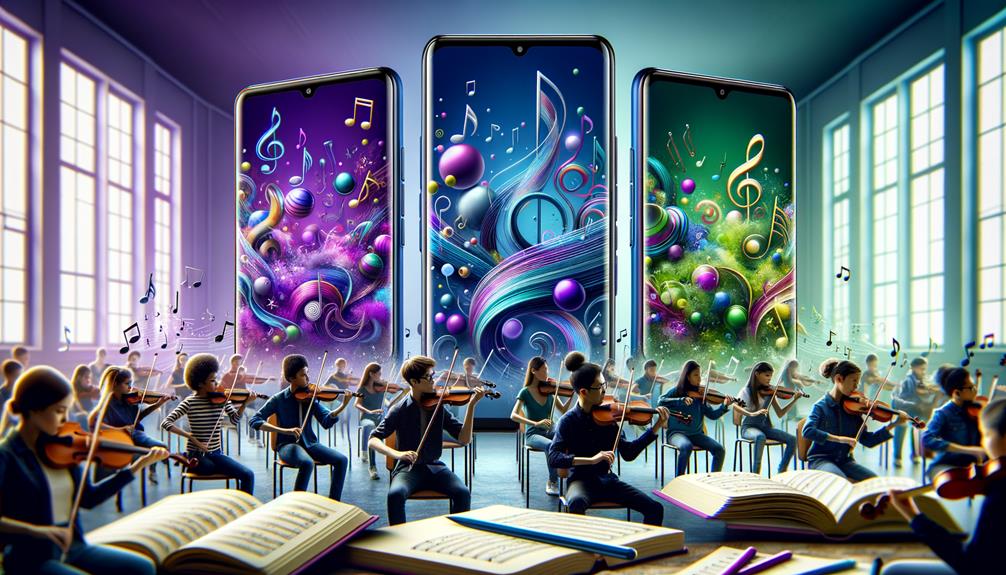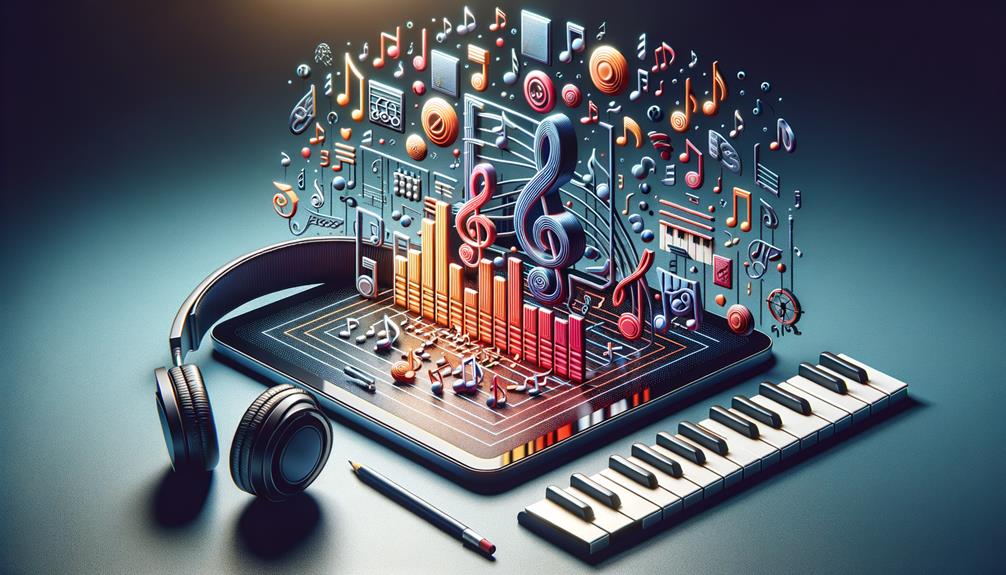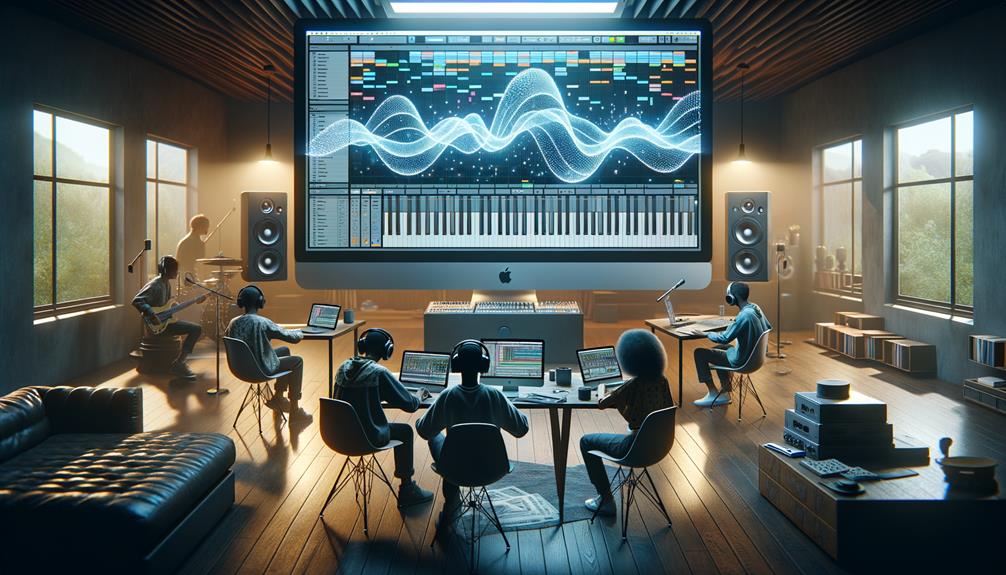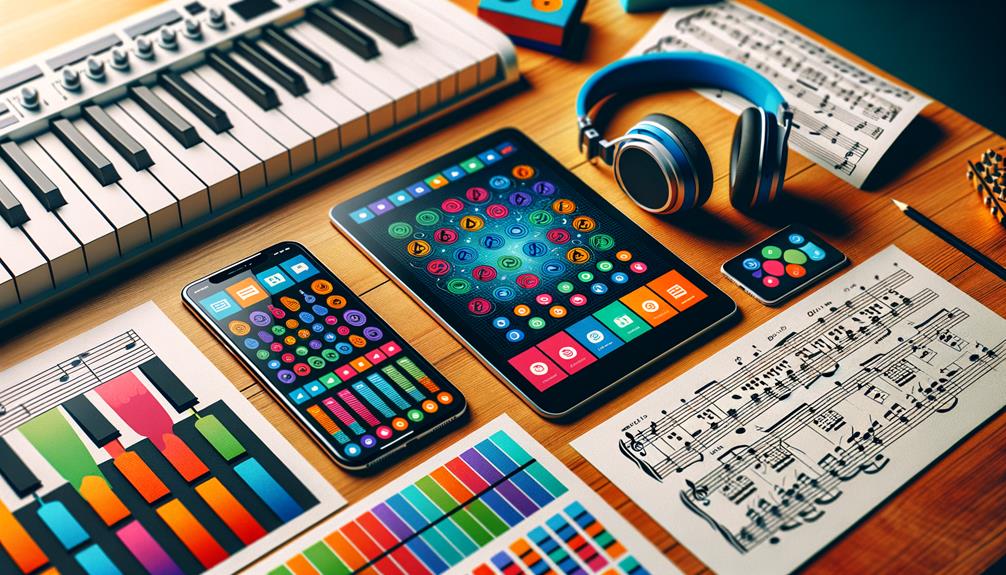
I've tested countless music education apps, but in 2024, ABRSM Theory Trainer, Learning Music From Ableton, and My Music Theory rise above the rest. ABRSM Theory Trainer excels in solidifying foundational theory with interactive exercises and real-time feedback. Learning Music From Ableton combines practical music-making with theory, providing a hands-on learning experience using DAW functionality. My Music Theory, with its detailed multimedia content, prepares users for various exams with a structured approach to advanced theoretical concepts. If you're seeking the best in music education and practice, these apps are indispensable – and there's much more to discover about their unique benefits.
ABRSM Theory Trainer

I find the ABRSM Theory Trainer to be an invaluable resource for music theory students, offering a structured and progressive approach from Grade 1 to Grade 5.
The app's real-time feedback is particularly beneficial, allowing students to immediately correct and understand their mistakes.
However, its lack of multimedia content and zoom function can limit the user experience for some learners.
Launched in 2019, the ABRSM Theory Trainer offers a structured and user-friendly approach to music theory education for learners at Grades 1 through 5.
With its intuitive design, the app simplifies the complexities of music theory, making learning music both accessible and engaging. It seamlessly integrates music education with ear training, interactive questioning, and real-time feedback, ensuring users can grasp concepts effectively.
The audio interface is straightforward, enhancing the overall experience of using training apps for music theory. While it excels in progressive content delivery, its limited multimedia content and lack of zoom functionality may pose challenges for some.
Nonetheless, the app's strengths in providing a solid foundation in music theory make it an invaluable resource.
Learning Music From Ableton

Next, let's explore 'Learning Music From Ableton', an interactive course that bridges practical music-making with foundational music theory.
I appreciate how it combines rhythm, pitch, harmony, and notation into a hands-on experience using embedded DAW functionality, making it ideal for beginners and younger students.
Best of all, it's a free resource that builds cumulative knowledge, ensuring a smooth progression in music creation skills.
Learning Music from Ableton provides an immersive, hands-on approach to mastering the essentials of rhythm, pitch, harmony, and notation through interactive music-making.
This free app revolutionizes music education by integrating DAW functionality directly within the course. Students engage with music creation through practical exercises, making learning both effective and exciting.
The structured three-week program is suitable for beginners and younger students, ensuring accessibility and inclusiveness. Ableton's platform encourages real-time audio practice, allowing students to apply theoretical concepts immediately.
It's a fantastic tool for anyone wanting to immerse themselves in music theory and production without additional software costs. By blending education and engaging creation, Ableton empowers students to explore and shape their musical journey freely.
My Music Theory

When it comes to mastering music theory, I find My Music Theory to be an invaluable resource.
Developed by Victoria Williams, this app offers extensive courses that cater to various music education exams like ABRSM and GCSE, making it perfect for students beyond Grade 5.
The sequential learning structure and multimedia resources provide a personalized and effective way to build cumulative knowledge and tackle complex concepts.
My Music Theory stands out as a robust platform offering structured courses that align with various renowned music education standards like ABRSM, Trinity, GCSE, and A Level, making it an invaluable resource for learners at different stages of their musical journey.
This app excels in providing training through its impressive array of multimedia content, which includes detailed explanations and contextual exercises. It's particularly useful and engaging for those beyond Grade 5 and A Level students, who benefit from the advanced skill development it supports.
Unlike other tools such as Piano Maestro, My Music Theory focuses deeply on the theoretical aspects of music creation. This structured approach guarantees a thorough understanding of music theory principles for users at different levels.
